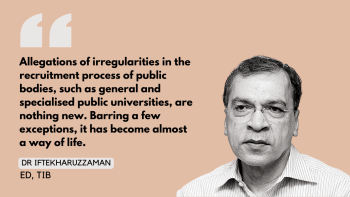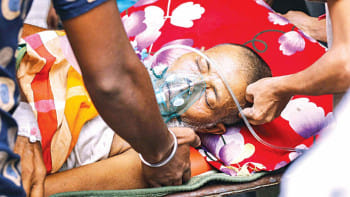Healthcare in Dhaka: A story of resilience and community

I was on my morning walk when I received a phone call from my Ammu, who was in Dhaka at the time. Ammu asked me to sit down—she had shocking news that Abbu had lost consciousness that afternoon, and she had decided to take him to the ICU. His carbon dioxide levels were very high and the prognosis was bleak: he may have less than 48 hours to live. I booked the earliest flight to Dhaka from Dallas, Texas in the US (which happened to be that same evening).
After the long journey "home" to Dhaka, I met Ammu at the hospital right away. Abbu was on life support at this point, but conscious. He was intubated and unable to speak, but aware enough to write notes. He even gave me a big smile, and signalled to ask how my children were. I was more than relieved that he recognised me—the stories I had told myself for the prior 24 hours were less than pleasant.
Over the next 10 days, I was to see a version of Abbu that is worth writing about, in addition to learning some important lessons about how the hospital system in Dhaka works. I set myself a goal that I'd like to see Abbu back at their flat before I went back to Texas. I choose to leave you with things that readers can apply to similar situations, should you run into them.
Lessons from Abbu
Abbu has been my role model for life, career, and parenting. Here's what I learned from Abbu while he was in a hospital bed and I was serving him as best as I could, alongside Ammu and other family members.
Power of social capital
Abbu is an adored personality around the world—friends and colleagues showed up and checked in on him daily while he was in hospital. People brought food for my mom and I, provided a place to stay, and offered help along the way. I was blown away. Influential folks spoke to hospital management to expedite Abbu's move through medical protocol. The support was incredible, and we are so very grateful for the community's kindness and generosity.
Willpower
I watched Abbu progress on a daily basis, truly amazed by his willpower. Believers know that you rely on the will of a higher power in difficult times. Yet, to experience an individual's willpower, resilience, and will to persevere in difficult circumstances is truly inspiring. Not only was Abbu one of very few conscious ICU patients, he was kind to those around him, persistent in his desire to leave for better conditions, and was able to communicate his desire to live. Doctors had written off Abbu when he'd arrived unconscious to the hospital, treatment brought him back, but his own fight to survive saved him.
Continuous learning
Abbu is a recent cancer patient and the last three years have been tough for him health-wise. He learned new skills to keep himself healthy throughout surgery, radiation, and PEG tube feeding. My father speaks at least five languages fluently, started learning Spanish in his 70s, knows much about the lives of Uber drivers and rickshaw pullers he encounters, and is always learning. Abbu is currently re-learning how to walk and eat by mouth again, redefining for us what continuous learning means.
Practicalities of hospitals in Dhaka
Influence matters
Who you know in Dhaka matters more than you might think. My parents have an extensive network, through which we had access to the highest levels of hospital management. The managing director of the hospital was a very kind gentleman who answered my incessant inquiries and was able to pass the messages on to ICU doctors and nurses as necessary. They were also able to exercise influence to allow us to overcome each hurdle to go from the ICU to the High-dependency Unit (HDU) to a hospital cabin in a matter of days instead of weeks. So, if you do know anyone influential in Dhaka, ask for help. Many will lend a hand or make a phone call.
Doctors may need empathy training
"Apni ki daktar?" or "Apnar meye ki daktar?" were questions asked of us when we inquired about Abbu's specific conditions, medications, and progress. I acknowledge that ICU doctors have a really tough job. They see people die everyday. They don't, however, seem to exhibit much empathy for the patients. Abbu was just another body taking up an ICU bed. Do I blame them? Not anymore, being further from the situation. But in the moment, I felt confusion, anger, and disbelief at their disdain. Some doctors dismissed our inquiries. At one point, the doctors exchanged smirks for having put me in my place by saying that the cardiac medications I was asking to discontinue (Abbu has a generally healthy heart for someone in his 70s) were drugs Abbu would have to take for a month.
Empathy is a learned trait and no longer considered a soft skill. I genuinely feel that many of these young doctors needed empathy training. It's a critical requirement to treat one's patients as human beings who need tender love and care. Empathy for the patients' family members should be part of this. I specifically call out the ICU doctors in this case because the bedside manners of nurses/caregivers were much better than those of the younger duty doctors/consultants. Senior doctors engage with patients with a different degree of care entirely, so experience definitely plays a part here.
During Abbu's cancer treatment and the complications he faced in the US, doctors acted as partners—answering every question—and were always on the side of the patient. We all wanted the best for the one suffering most. The doctors treated us as their equals and not as non-doctors to dismiss with the waving of a hand.
Ask questions and be persistent
Your loved one's care is your responsibility. You need to be your loved one's best advocate because nobody else in the hospital system will be.
At one point, Abbu was on 23 different medications, many of which were not necessary (as validated by our family doctors). We pored over lists of medications, persisted with questions on why a certain medication was necessary, and double-checked test results with doctor friends and family.
Some ICU doctors in Dhaka act like their advice is beyond questioning. But don't be discouraged. Continue to ask questions about tests, medications, feeding, and charts. Medicine should be personalised (to whatever extent possible), not generalised. I made it my personal mission during those handful of days to be "the son that my parents never had"—as so many people have lamented to my parents, who have two daughters. Constant vigilance is the name of the game, and creating individual partnerships wherever possible is of the essence.
Abbu's health continues to progress slowly. Human beings are resilient, and love and respectful care can help one overcome many hardships. If you are in a similar situation, take the time to process your own emotions. I was so mission-driven and practical that, once back in Texas, I found myself crying out of the blue, needing to take time to experience how I really felt.
Doctors and family members both must treat patients kindly and respectfully—not as a number, not just as another ailing, aged family member. Living—and dying—with dignity is everyone's right. Playing even a small part in allowing someone to live with dignity is a blessing.
Irina Ahmed Long is a senior banker based in the US.
Views expressed in this article are the author's own.
Follow The Daily Star Opinion on Facebook for the latest opinions, commentaries and analyses by experts and professionals. To contribute your article or letter to The Daily Star Opinion, see our guidelines for submission.


 For all latest news, follow The Daily Star's Google News channel.
For all latest news, follow The Daily Star's Google News channel. 













Comments